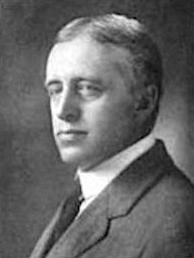Irving Babbitt facts for kids
Quick facts for kids
Irving Babbitt
|
|
|---|---|
 |
|
| Born | August 2, 1865 Dayton, Ohio
|
| Died | July 15, 1933 (aged 67) Cambridge, Massachusetts
|
| Education | Harvard College |
| Occupation | Academic, literary critic |
| Spouse(s) |
Dora May Drew
(m. 1900) |
| Children | 2 |
Irving Babbitt (born August 2, 1865 – died July 15, 1933) was an American teacher and writer. He was known for starting a way of thinking called the New Humanism. This idea greatly influenced how people talked about books and conservative ideas between 1910 and 1930.
Babbitt was a cultural critic, meaning he looked closely at society's culture. He often disagreed with romanticism, a style of art and literature that focused on feelings and nature. He believed in humanism, which means focusing on human values and reason. His book, Democracy and Leadership (1924), is still important for understanding conservative political ideas.
Contents
Early Life and Studies
Irving Babbitt was born in Dayton, Ohio. His family moved around the USA a lot when he was young. From age 11, he grew up in Madisonville, a part of Cincinnati, Ohio.
He started studying at Harvard College in 1885 and finished in 1889. After graduating, he taught classics (ancient Greek and Roman studies) at the College of Montana.
After two years, he went to France to study at the École Pratique des Hautes-études in Paris. There, he spent a year learning about Pali literature and Buddhism. Later, he earned a master's degree from Harvard, where he also studied Sanskrit, an ancient Indian language.
Teaching at Harvard
After his studies, Babbitt decided not to focus only on classical studies. He took a teaching job at Williams College for one year, teaching romance languages (like French and Spanish).
In 1894, he was offered a teaching position at Harvard, this time in French. He stayed at Harvard for the rest of his career. He became a full professor of French literature in 1912. He is also known for helping to start the study of comparative literature at Harvard. This field compares literature from different cultures and languages.
In 1921, he was chosen as a member of the American Academy of Arts and Sciences. This is a group that honors important thinkers and scholars. Later, in 1960, Harvard University created a special teaching position named after him: the Irving Babbitt Professor of Comparative Literature.
The New Humanism Movement
In the early 1890s, Irving Babbitt started working with Paul Elmer More to create the main ideas of what he called the "New Humanism." In 1895, he gave a talk titled What is Humanism?. In this talk, he began to criticize the ideas of Jean-Jacques Rousseau.
Babbitt believed that teaching should focus on the "eternal" moral and spiritual messages in great books. He felt that some modern studies, which focused too much on small details of texts, missed this important point. His ideas were often shared in short essays, which were later put together into books. His book Literature and the American College, published in 1908, caused a lot of discussion.
He continued to write, often criticizing authors from his own field of French literature. He also spoke out against Francis Bacon and against naturalism (a style that shows life as it is, often focusing on harsh realities) and utilitarianism (a belief that actions should aim for the greatest good for the greatest number).
Babbitt strongly believed in the importance of a person's moral character and human reason. He emphasized that people need to control their desires and practice self-discipline. He opposed naturalism because he felt it suggested that outside forces control people more than their own character. He also strongly criticized romanticism, especially the ideas of Jean-Jacques Rousseau. Babbitt warned that Rousseau's ideas were a negative influence on modern culture. He disliked too much sentimentality, the idea that humans are perfect, and utopian thinking (dreaming of perfect societies) that came from romanticism. His views were more in line with older, classical literature.
Democracy and Leadership
In 1924, Babbitt published Democracy and Leadership, which is perhaps his most famous book. In this book, he shared his political views, which came from his humanistic ideas. He looked at and criticized political theories that came from naturalism.
Babbitt criticized two main parts of naturalistic thought. One was the mechanistic or utilitarian side, which came from Francis Bacon. The other was the sentimental side, linked to Jean-Jacques Rousseau. Babbitt argued that both gave too much importance to natural forces and uncontrolled human feelings. He felt they ignored how important individual conscience and moral character are.
He also disagreed with historical theories that said events are determined by fate, from thinkers like Saint Augustine to Bossuet. Babbitt stated that a strong moral character is the most important quality for leaders in a democratic society. He warned about the dangers of unchecked majoritarianism, where the majority's will might ignore the rights of minorities.
Babbitt's political ideas fit into the tradition of classical liberalism, which includes thinkers like Aristotle and Edmund Burke. His book is seen as a classic conservative political work. Important conservative scholars, such as Russell Kirk, were influenced by Babbitt's ideas. Kirk even called the book "...one of the few truly important works of political thought."
His political views came from his strong belief that moral character is most important. He felt that social activism and emotional responses could not replace a person's individual conscience and character. He stressed personal responsibility and did not like the idea of "everybody's interference in everybody else's business."
Personal Life
Irving Babbitt married Dora May Drew on June 12, 1900. They had two children, Esther and Edward Sturges.
He passed away at his home in Cambridge, Massachusetts, on July 15, 1933.
 | James B. Knighten |
 | Azellia White |
 | Willa Brown |

